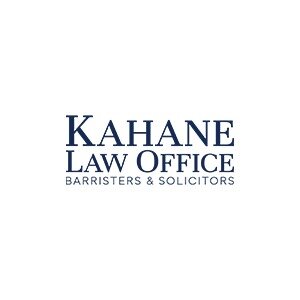Best Motorcycle Accident Lawyers in Edmonton
Share your needs with us, get contacted by law firms.
Free. Takes 2 min.
List of the best lawyers in Edmonton, Canada
About Motorcycle Accident Law in Edmonton, Canada
Motorcycle Accident Law in Edmonton, Canada, is fundamentally underpinned by the principles of negligence law, as it applies to motor vehicle accidents. Edmonton, like the rest of Alberta, operates under a "Fault Insurance" system. Under this system, if a motorcyclist is involved in an accident which isn't their fault, they have the right to sue the at-fault driver for damages and losses, which could include medical expenses, loss of earnings, and emotional distress.
Why You May Need a Lawyer
The nature of motorcycle accidents often results in significant injuries or even fatalities, which can lead to complex and high-stakes legal proceedings. Lawyers specializing in motorcycle accidents can help guide victims through the complexities of negligence claims, insurance policies, and can also help to ensure rightful compensation. Other situations that necessitate legal help include when the fault of the accident is contested, when dealing with uninsured or under-insured drivers, and when injuries sustained are severe or result in permanent disabilities.
Local Laws Overview
Key aspects of local laws relevant to motorcycle accidents in Edmonton include the stipulation that all motorcyclists wear helmets as per the Alberta Traffic Safety act. Factor such as disobeying traffic signals, speeding, aggressive riding, or intoxicated riding may also put a rider at-fault. Additionally, all motor vehicle operators, including motorcyclists, in Edmonton are required to have third-party liability coverage, accident benefits coverage, and uninsured motorist coverage as minimum insurance requirements.
Frequently Asked Questions
What do I do after a motorcycle accident?
After a motorcycle accident, it's important to seek immediate medical attention, notify the police, exchange information with other parties involved, gather evidence if possible, notify your insurance company, and consider contacting a lawyer.
Does the helmet law affect the determination of fault?
Yes, if a motorcyclist is not wearing a helmet as required by law at the time of the accident, this may impact their eligibility for certain compensation. However, it does not automatically put the fault on the motorcyclist.
What does it mean that Alberta uses a Fault Insurance system?
A "Fault Insurance" system means that the individual who caused the accident (fully or partially) is responsible for the damages and injuries caused. Their insurance is usually the one to cover these costs.
What constitutes a severe injury from a motorcycle accident?
Severe injuries commonly include broken bones, spinal cord injuries, traumatic brain injuries (especially if the victim was not wearing a helmet), serious burns, amputations, and any other injuries that may result in permanent disability.
How long do I have to file a suit after a motorcycle accident?
In Alberta, you generally have two years from the date of the accident to start legal proceedings for a personal injury claim. There are however certain situations where this time limit can vary.
Additional Resources
For additional information, you can seek advice from institutions such as the Alberta Motor Association, Alberta's Office of Traffic Safety, and the Edmonton Police Service. Alberta Health Services is also a valuable resource for understanding the medical aspects related to motorcycle accidents.
Next Steps
If you have been involved in a motorcycle accident and need legal assistance, you should consider contacting a lawyer specialized in motorcycle accident law. While your insurance company can guide you through certain parts of the process, a lawyer will prioritize your best interests and help you navigate through the complexities of the legal system to ensure fair compensation.
Lawzana helps you find the best lawyers and law firms in Edmonton through a curated and pre-screened list of qualified legal professionals. Our platform offers rankings and detailed profiles of attorneys and law firms, allowing you to compare based on practice areas, including Motorcycle Accident, experience, and client feedback.
Each profile includes a description of the firm's areas of practice, client reviews, team members and partners, year of establishment, spoken languages, office locations, contact information, social media presence, and any published articles or resources. Most firms on our platform speak English and are experienced in both local and international legal matters.
Get a quote from top-rated law firms in Edmonton, Canada — quickly, securely, and without unnecessary hassle.
Disclaimer:
The information provided on this page is for general informational purposes only and does not constitute legal advice. While we strive to ensure the accuracy and relevance of the content, legal information may change over time, and interpretations of the law can vary. You should always consult with a qualified legal professional for advice specific to your situation.
We disclaim all liability for actions taken or not taken based on the content of this page. If you believe any information is incorrect or outdated, please contact us, and we will review and update it where appropriate.









